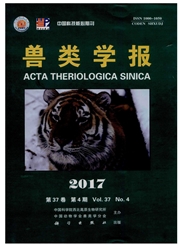

 中文摘要:
中文摘要:
动物稳定体重的维持需要能量摄入和消耗之间的平衡。运动是影响动物能量平衡的重要因素之一。为了理解运动对布氏田鼠的生理学效应,我们在室内条件下,运用踏车测定了强迫运动训练6周后动物的体重、体脂含量、摄食量和瘦素浓度的变化。摄食量采用代谢笼法测定,体脂含量采用索氏提取法,血清瘦素含量采用放免试剂盒测定。结果发现强迫运动训练6周对布氏田鼠的体重和摄食量都无显著影响,与非运动训练组田鼠相比,运动训练组田鼠的身体脂肪重量降低了3.5g,运动组田鼠的血清瘦素水平比对照组下降了30%。对照组田鼠的血清瘦素与体脂含量具有明显的相关性,但运动组则不具有相关性。这些结果表明在强迫运动训练期间布氏田鼠不是通过增加食物摄入,而可能是通过动员贮存的脂肪和减少非活动性能量消耗等方式来维持自身的能量平衡。瘦素在长期强迫运动训练过程中对身体脂肪含量的变化具有调节作用。
 英文摘要:
英文摘要:
Maintaining a stable body weight requires a balance between energy intake and energy expenditure. Exercise, which can increase energy expenditure, is one of the most important factors affecting energy balance for animals. In order to understand the physiological effects of exercise, we measured changes in body mass, body fat content, food intake, and serum leptin levels in Brandt ' s voles ( Lasiopodomys brandtii ) during 6-weeks of forced exercise training with of treadmill. Food intake was measured with food trials. Body fat mass was measured with the Soxhlet method. Serum leptin concentration was measured with multispecies RIA kit. The results showed that exercise training decreased serum leptin concentrations by 30% compared with controls and no significant effects on body mass and food intake were detected during 6 weeks exercise training. Body fat decreased by 3.5 grams in exercise trained voles, but was not significantly different from controis. There is a positive relationship between serum leptin concentrations and body fat content in control voles, but not for exercise trained voles. These results suggest that the decrease in serum leptin levels caused by forced long-term excise training is independent on the changes in body mass and body fat content. Brandt' s voles may mobilize body fat and decrease nonexercise energy expenditure rather than to increase food intake to regulate energy balance during forced exercise training.
 同期刊论文项目
同期刊论文项目
 同项目期刊论文
同项目期刊论文
 Large litter size increases maternal energy intake but has no effect on UCP1 content and serum-lepti
Large litter size increases maternal energy intake but has no effect on UCP1 content and serum-lepti Short photoperiod influences energy intake and serum lepin level in Brandt,s voles (Microtus brandti
Short photoperiod influences energy intake and serum lepin level in Brandt,s voles (Microtus brandti Regulation of body weight and thermogenesis in seasonally acclimatized Brandt's voles (Microtus bran
Regulation of body weight and thermogenesis in seasonally acclimatized Brandt's voles (Microtus bran Seasonal regulations of energetics, serum concentrations of leptin, and uncoupling protein 1 content
Seasonal regulations of energetics, serum concentrations of leptin, and uncoupling protein 1 content Photoperiodic regulation in energy intake, thermogenesis and body mass in root voles (Microtus oecon
Photoperiodic regulation in energy intake, thermogenesis and body mass in root voles (Microtus oecon Suppression of thermogenic capacity during reproduction in primiparous brandt’s voles (Microtus bran
Suppression of thermogenic capacity during reproduction in primiparous brandt’s voles (Microtus bran Metabolism and thermoregulation in Maximowiczi’s voles (Microtus maximowiczii) and Djungarian hamste
Metabolism and thermoregulation in Maximowiczi’s voles (Microtus maximowiczii) and Djungarian hamste Ultradian rhythms and the nutritional importance of caecotrophy in captive Brandt's voles (Lasiopodo
Ultradian rhythms and the nutritional importance of caecotrophy in captive Brandt's voles (Lasiopodo Thermogenesis, food intake and serum leptin in cold-exposed lactating Brandt's voles (Lasiopodomys b
Thermogenesis, food intake and serum leptin in cold-exposed lactating Brandt's voles (Lasiopodomys b Photoperiod and temperature can regulate body mass, serum leptin concentration, and uncoupling prote
Photoperiod and temperature can regulate body mass, serum leptin concentration, and uncoupling prote Effects of photoperiod history on body mass and energy metabolism in Brandt's voles (Lasiopodomys br
Effects of photoperiod history on body mass and energy metabolism in Brandt's voles (Lasiopodomys br Seasonal adjustments in body mass and thermogenesis in Mongolian gerbils (Meriones unguiculatus): th
Seasonal adjustments in body mass and thermogenesis in Mongolian gerbils (Meriones unguiculatus): th Basal metabolic rate and organ size in Brandt's voles (Lasiopodomys brandtii): Effects of photoperio
Basal metabolic rate and organ size in Brandt's voles (Lasiopodomys brandtii): Effects of photoperio Individual variation and repeatability of the aerobic performance in Brandt’s voles (Lasiopodomys br
Individual variation and repeatability of the aerobic performance in Brandt’s voles (Lasiopodomys br Different physiological roles of serum leptin in the regulation of energy intake and thermogenesis b
Different physiological roles of serum leptin in the regulation of energy intake and thermogenesis b Humoral immune response suppresses reproductive physiology in male Brandt's voles (Lasiopodomys bran
Humoral immune response suppresses reproductive physiology in male Brandt's voles (Lasiopodomys bran Effects of fasting and refeeding on body mass, thermogenesis and serum leptin in Brandt's voles (Las
Effects of fasting and refeeding on body mass, thermogenesis and serum leptin in Brandt's voles (Las Cold exposure does not decrease serum leptin concentration, but increases energy intake and thermoge
Cold exposure does not decrease serum leptin concentration, but increases energy intake and thermoge Limits to sustained energy intake XI. A test of the heat dissipation limit hypothesis of lactating B
Limits to sustained energy intake XI. A test of the heat dissipation limit hypothesis of lactating B Food Restriction and Refeeding Has No Effect on Cellular and Humoral Immunity in Mongolian Gerbils (
Food Restriction and Refeeding Has No Effect on Cellular and Humoral Immunity in Mongolian Gerbils ( Physiological and biochemical basis of basal metabolic rates in Brandt's voles (Lasiopodomys brandti
Physiological and biochemical basis of basal metabolic rates in Brandt's voles (Lasiopodomys brandti Effects of leptin infusion during peak lactation on food intake, body composition, litter growth and
Effects of leptin infusion during peak lactation on food intake, body composition, litter growth and 期刊信息
期刊信息
